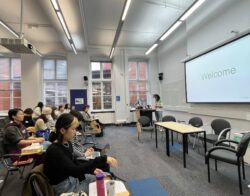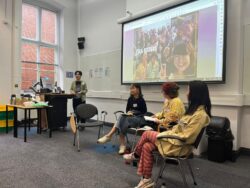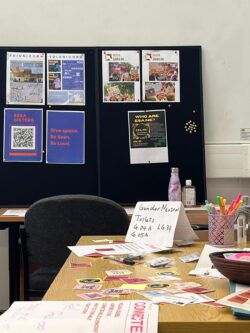BSA X CIGS: Researching feminism in East and south-east Asia (ESEA)
BSA X CIGS Postgraduate forum regional event: Researching feminism in East and south-east Asia (ESEA)
by
Taoyuan Luo
The British Sociological Association (BSA) postgraduate forum regional event, ‘Researching Feminism in East and Southeast Asia (ESEA),’ was held on October 13th at the University of Leeds. This one-day event brought together over 30 participants, including postgraduate researchers, early career researchers, political scientists, artists, and community activists. Covering interdisciplinary topics from gender studies, sociology, media studies, human geography, and history, this event aimed to provide a platform for discussions on generating feminist knowledge within higher education systems and beyond.
This event provided an important opportunity for scholars with East and Southeast Asian backgrounds to share their work-in-progress research and exchange experiences regarding navigating the uncertainties within UK universities as migrant workers. It also highlights scholars and activists’ continuous practice of feminism in pedagogy, activism, and everyday interactions, as a response to the context of the overtly anti-Asian racial violence that has emerged since the Covid-19 pandemic and the increasing xenophobic sentiments in British society after Brexit. In this short chronicle blog, I will first revisit the main discussion topics of the event and then share my reflections on creating a feminist space as an event organizer.

Figure 1 The event venue (Photo by Ruoxi Liu)
This event had one keynote speech, two student presentation panels, and one art and activism roundtable discussion. Dr Eva Cheuk-Yin Li opened this event by mapping out the geopolitics of queer archives and media representation in East Asia. Following this speech, the audience further discussed the representations on what kind of examples are used to represent queer media culture and how these examples shape their research.
After the keynote speech, the first panel featured postgraduate students’ ongoing research in political voice and resistance in marginalized spaces, including political practices among Indonesian migrant domestic workers, Indonesian and Indian women’s navigations with climate changes, as well as the constructions of Chinese-ness. Dr Sarah Liu responded to these students’ paper presentations with constructive and supportive suggestions on doing research, particularly focusing on the ways to justify the novelty of these research works and contributions to the current theoretical discussions.
Following student research presentations, we hosted a roundtable discussion featuring artist craft maker Sue Man, community organizer Si Long Chan, and feminist student artist Ann Zhang. Dr Leiyun Ni chaired the discussions on the challenges art activists face, the strategies for negotiating differences in their activities, and the changes with ESEA activism in recent years and how these changes have affected the ways of doing art activism. Their roundtable discussion also explored the concept of feminist solidarity.

Figure 2 Roundtable discussion on community care and feminism (Photo by Ruoxi Liu)
After the interactive sections exploring how feminist knowledge is produced outside the university system, we had the final student paper presentation panel, focusing on digital feminism in India, Japan, and China. In this panel, postgraduate researcher Nivedita Chatterjee discussed conflicts between the ethical approval process in UK universities and the research participants’ questions on the necessity of university consent forms. Dr Hua Ma compared the beauty culture in her own research and the beauty culture in Japanese hashtag feminism #KuToo.

Figure 3 Feminist stickers on the registration desk (Photo by Ruoxi Liu)
As the conference organizer, I made an effort to challenge the hierarchical structures by incorporating small gestures into the event, aiming at creating a feminist event for feminists. For example, cultural and creative practices (e.g., feminist stickers) were used as a creative means to create a trans-inclusive and supportive environment. These stickers state love for our trans-friends and solidarity with activists on trans rights. They received positive feedback from the participants. I believe creative practices like this can help to begin further action in building a trans-inclusive campus. In addition, I used my role as the conference organiser to put into practice what I have learned from my experiences of receiving feminist support and care during my journey as a PhD candidate in the Centre for Interdisciplinary Gender Studies, School of Sociology and Social Policy. That is, feedbacking students’ work by recognizing their progress and providing supportive and constructive feedback is a feminist practice. Seeing the progress is a feminist practice. Recognizing the easily overlooked extra efforts made by non-native English speakers in their journey to become researchers in a UK university is also a feminist practice.
During the event, I witnessed touching moments of feminist care, building feminist communities, the initiation of further collaborations, and a re-evaluation of the methods of feminist knowledge production. Organising this event was never the work of one person but a collective act of feminist activism. Thanks to BSA and CIGS' support, I can see how feminism flows and how feminisms convey many future-oriented possibilities.
Bio: Taoyuan Luo is a feminist, a cat lover, and a final-year PhD candidate at the Centre for Interdisciplinary Gender Studies, School of Sociology and Social Policy, University of Leeds. She holds a BA in Journalism and a MA in Cultural and Creative Industries. Her research interests are primarily located in the theories of postfeminism, feminist communities, feminist creative practices, digital feminism, popular culture and mediated texts. She is currently working on her PhD thesis Identification or alienation: a study of young Chinese women’s perceptions of feminism (a working title). Please contact her via email (sstl@leeds.ac.uk) or Twitter at @TaoyuanL.
